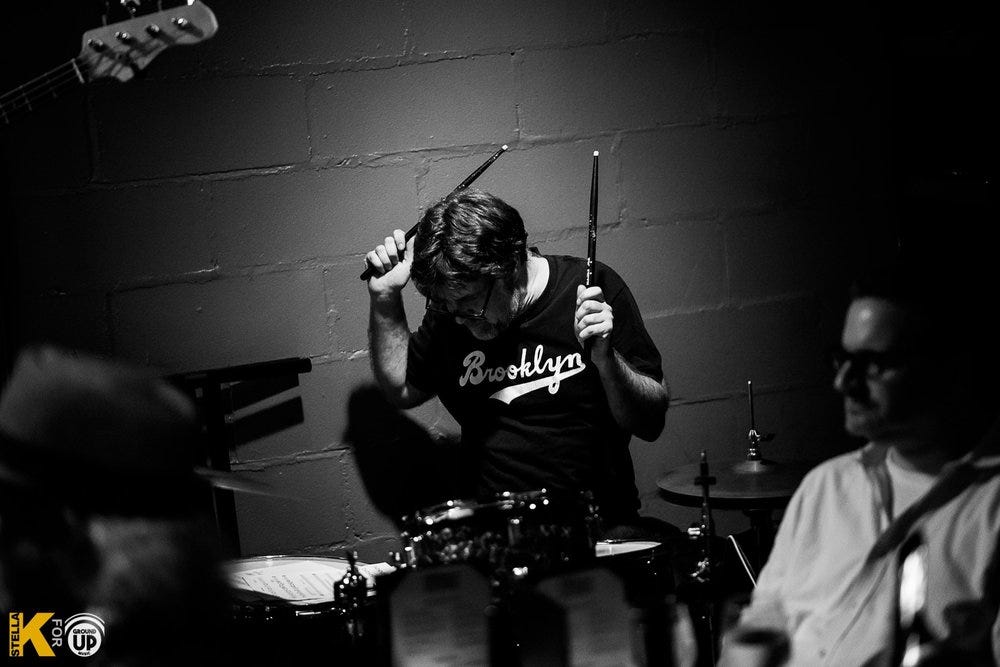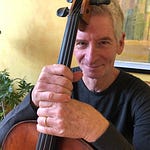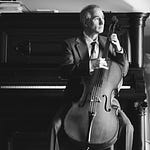003 Tony Mason
Today we're talking with one of my favorite drummers Tony Mason. Something of a local legend in the New York club scene, he's played with everybody and you can always trust him to keep it bouncing, no matter who he's appearing with that night.

Photo by Stella-K
Transcript:
[INTRO] You’re listening to Play It Like Its Music, exploring the lives and craft of the people who play. Today we're talking with one of my favorite drummers Tony Mason. Something of a local legend in the New York club scene, he's played with everybody and you can always trust him to keep it bouncing, no matter who he's appearing with that night.
I went to his practice space in Brooklyn, we had a great time. Guy has a heart the size of a football field, and it comes out in his playing. There's a lot of humor, depth, versatility, dedication and it was an honor to get some of his story on tape. Let's hang out with Tony.
TREVOR EXTER: Tell me your name and instrument?
TONY MASON: Tony Mason, drums and percussion.
TE: Where are you from originally?
TM: I was born in New York City, then I moved down to Southern Pines, North Carolina when I was eight years old, then came back to New York when I was 19 right before my 20th birthday.
TE: How long have you been playing drums?
TM: Let me see... I am [ahem] years old. [laughs] Whoa I've been playing for a long time. I've been playing since I was 7 years old, so I've been playing for 43 years, so yeah.
TE: What was the approach like?
TM: The approach was really natural. I mean, I know it's a cliche thing to say about everyone says "I just started picking up spoons and banging on pots and pans", but you know in my case it was the arm of a couch. A green couch, and I can still remember it. And I actually did have a pair of drumsticks. I was obsessed with the Beatles and Ringo Starr, and you know it was just very natural. It was something that I just enjoy doing. I didn't really even think about it. It wasn't like no one suggested, "maybe you should play drums Tony". It was nothing that was forced upon me. It was something that I love doing and kind of came easy to me. You know a lot of people say well, "I didn't choose music, music chose me", and I kind of feel that way.
TE: Seems to me on the outside, you work like all the time. Is that a correct view?
TM: Yeah. I mean, it's a combination of projects that I've been involved with for a long time, and there's people that I've been working with for over 20 years or more, and little stretches of that. There's that and there's also the freelance stuff and teaching and recording and just kind of piecing it all together. So yeah, I usually try to keep busy. Lately it's been a little bit more on the local tip.
TE: Was there a period of doubt?
TM: No, there was never any doubt of "this is what I should be doing". This is what I wanted to do. I think in high school... There's some moments where I was very interested in sports journalism, I had a moment to maybe go into psychology, but it was always about music. There were times in my mid-20s when reality set in that, you know "this is going to take a lot of time and a lot of work, and there's a lot of competition. I'd better get my shit together." And a couple of fearful moments of like "eeeh!" But those moments actually pushed me to the next level to work hard.
You know sometimes those kind of feelings if used in a positive way can propel you to kick your own ass and push yourself and get better, because you have to. Especially now. I had a teacher back in the 80s that said, "you watch. You know as time goes on the level is just going to get higher and higher and higher."
Because of the education and technology and what's accessible to people now kids are coming up just playing ridiculous! At a ridiculous level at a much younger age than where I was. I mean a lot of us.
TE: You want to play for a second?
TM: Yeah sure. [plays]
I remember at Manny's, back in the day Manny's had this little drum room where you could just go in and check out cymbals ... Mostly to check out cymbals or snare drums, and I'd always remember thinking like "God when I'm in this room. I don't know what to play man. I'm the worst drummer when I'm at Manny's. I just, I kind of suck man!" Because it's just like, "play something!" and it's like, "I don't know!"
I had to have music around me. I'm not a drummy-drummy kind of drummer.
TE: How much do you actually work on the technical side of things?
TM: I work on it a lot. I would say especially in the last 10 years as far as hand technique I've really changed my approach, and that's due to studying with teachers like Joe Morello and Dom Famularo and all my teachers in the past... Thinking about what they said. You know sometimes you don't realize it takes years after studying with someone to finally.... The light bulb goes on you go like "ah okay, that's what they were talking about!" You know?
So yes. Getting back to your question, the technique thing. I do, and I really work on body movement, ergonomics, making sure that your form is proper, that you're using your body the way that it wants to go. So I do work on technique, but it's not... It's nothing fast. It's nothing really chops-oriented. It's more about sound and evenness and relaxation. I have a background in classical percussion. That's what I studied at Manhattan School of Music, and also one year at East Carolina. So a lot of the stuff I practice on the drums, it's kind of a crossover of what I learned playing classical.
You know, and vice versa. The two worlds help each other out a lot, and I urge my students to try and take a couple lessons with a couple classical guys or gals, and study some snare drum and mallets and timpani and work on your sound, very slow, and stuff like rebound and evenness and relaxation. Nothing too fast.
I think most drummers can tell you speed comes a lot more naturally when you're not really concentrating on speed.
TE: What was it like working with Joe Morello?
TM: Joe Morello? It felt like hanging out with my uncle. He was one of the most supportive, nicest men I've met in quite some time. And you know he passed away about 4 years ago, or so. Maybe longer than that. He was great, and he was very open.
He wasn't a jazz snob. Actually most of his students were Rock n Roll drummers. His approach was like "I don't care what you play, I don't care what grip you play. If you can play jazz playing match grip, I don't care. I just want you to know how to play the drum correctly." And he was the one that really started making me think about the body first, the stick second. You know, about your motions, hand positions and stuff like that.
He put out a couple DVDs, and one was, I think it was called "The Natural Approach." It wasn't drummy at all. It was almost like a study in how to use your body properly. Like some people might take Alexander technique, or what's the other one - feldenkrais? And stuff like that. So his thing was kind of like the Alexander technique for the drums. It was just like OK, this is how your wrist naturally wants to move. Do that and when you put the stick in your hand it's still moving the same way. You know so it was very cool, and funny. A lot of great stories. You know I only took about a half dozen lessons with him, but it's enough where I will be working on it for the rest of my drumming life.
And just a great, great guy man, and I remember one of the first lessons. He asked me to play for him. And I played some time, and I just traded fours. And I finished and he goes, "yeah, we're going to get along just fine." And that was such, that was one of the highest compliments I could get. I mean he didn't say "oh wow your amazing." He actually went on to say "you know, it's pretty raw... We need to refine some stuff, but yeah you're on the right path." And that just made me feel so good coming from him.
TE: How hard did you work before you really started to feel like you were "there"?
TM: I don't think I'm ever gonna feel like I'm there, but I will say I have been feeling more confident. You know when I first started playing it was really based on feel and I had no chops, and I had no technique man. And I always wanted to combine the two things, you know if you hear someone like say... Steve Gadd is a great example. He's someone who has kind of combined a lot of heart and soul and tons of groove, but he also has perfect snare drum technique. I mean, it's textbook and he's kind of combined those two where they work together. And so when I started studying with Joe and then later Dom and some other cats, and I felt like I was getting my hands together - I mean I'm never gonna be a Buddy Rich or a Vinnie Colaiuta or anything like that - but what I wanted is, I just wanted to know that what I'm going for... Usually it's going to come out and my hands aren't going to let me down.
And it's never going to be in a flashy way because I don't really hear the drums that way. I hear it more in the supportive "how can I lift the band" kind of way. You do need technique to do that. You know, right before you got here I was working on something. Didn't sound very good to me. You know? And after this is over I'm gonna work on it again, hopefully it'll get better than it was an hour ago.
TE: What was that thing?
TM: What I work on is very fundamental simple things like playing quarter notes. What I want to do on the bandstand, I need to prepare beforehand. And what that is is I want to make my fellow musicians feel good and feel supported. You know I think the best compliment that any drummer can get is when a fellow bandmate comes up to you after the gig and says you know, "hey man it's really comfortable playing with you. You make the music easy to play." Or I had a guitar player tell me it's like, "man, I play my best solos when you're playing drums cause I just feel like we don't have to force things and you can play simple and it's still going someplace." You know, but in order to make them feel comfortable I have to make myself feel comfortable. You know the old saying, "you gotta love yourself before loving someone else!" And as corny and textbook psychology as that might sound it really is true.
TE: It's a cliche for a reason.
TM: It is a cliche for reason. So my practicing is really based on that. Like how comfortable can I get? How can I get to the point - and this is a work in progress - of not having to work so hard, but still make it happen? Technique is involved in that, posture, basic stuff. And then from there if that's happening then you can take it anywhere, then you can go anywhere. You know?
TE: What's the sound of Tony Mason clearing his throat in the morning on the drums?
TM: Well like I was saying before, you know if... Let's say if I'm working on some time [plays] A lot of times I'll just work on you know swing time. Working on quarter notes, adding a little backbeat, a little Jimmy Cobb you know. Just making sure everything is bouncing. That has a lot to do with technique, but it also has to do with groove, where you're feeling the time. Dynamics, but I would say you know there could be times where I just kind of come in and you know [plays free] I might be in one of those moods where I need to get some shit out and just like just play some free stuff for about 10 minutes and just... I mean... One of the many joys of being a drummer is that it's good to get some stuff out. I mean I can't tell you how music has saved me, in so many times. You know just, whenever we're going through hard times or emotional times. Just getting to come down and be able to play an instrument that, one is musical, but also that is physical too.
TE: What was the last time you felt like it came through for you saved you?
TM: Where it really saved me... The last I remember, my mom passed away about 17 years ago. She died of cancer and I was down in North Carolina for about two months. Didn't touch the drums, didn't have any desire to and I mean, I'm sure there have been other occasions that have been more recently, but this just comes to mind. And I remember coming back to New York and the first thing I did is I went to my practice space and I played and it was such a nice release, and it really was one of those moments where it's like God, I'm so glad I've got music in my life. I'm so glad that I'm able to play an instrument. I'm so glad I'm able to play the drums. You know. I mean, I don't know what I would do if I didn't play. It'd be very strange existence.
[plays]
Thanks for coming today, man.
TE: Thanks for talking to me. How can people find you if they want to hire you?
TM: Well, website will be coming shortly. I've been saying that for like the last 15 years. "It's coming shortly" ...Um no, but like we were rapping before I do realize that I gotta step it up on on that front, but I would say if people want to get in touch with me they can either do it through my Facebook page or they can keep me a call and call me on the phone, email me and like that.
TE: Badass. Thank you.
TM: Thanks, bro.
TE: [OUTRO] All right about that. That was Tony Mason. You can find him on the bandstand. That's our show, thank you for listening, and thank Tony sharing his space with us. This podcast is an independent production hosted by me, Trevor Exter. Go to play it like it's music dot com to find out more, and please leave us a review on Apple podcasts and Stitcher... everywhere else you can find us. It's the most powerful thing you can do to put on the radar by far.
We want this show to be useful to you. Hanging out with real musicians at work is the best, and you just got a taste of it. See you next time. This is play it like its music.
Thank you so much for listening to the show it means everything. To have your ears and support each time you pass the link to your friends, review us on the web and help out financially.
These are the players I admire the most, and as a working musician myself I'm always looking to get to know them in a deeper way. Find out stuff that might help me become a better musician.
I love sharing these moments with you and reading your feedback and questions at our website, playitlikeitsmusic.com where you can browse other episodes and support the show.
We are 100% listener funded. It's how we can have the conversation we need to have in an age when we're all contending with a mutating professional landscape, jacked revenue streams and a lot of noise out there in the culture.
These are exciting times. It's almost as if the simple act of playing an instrument is a revolutionary one. We don't draw any lines between scenes or styles, so if you haven't done it already head over to the web site and join the community. You can use PayPal or make a recurring pledge through Patreon where we offer a selection of merch and rewards as always.
Thank you for listening and remember to play it like its music. I'm Trevor Exter.












Share this post